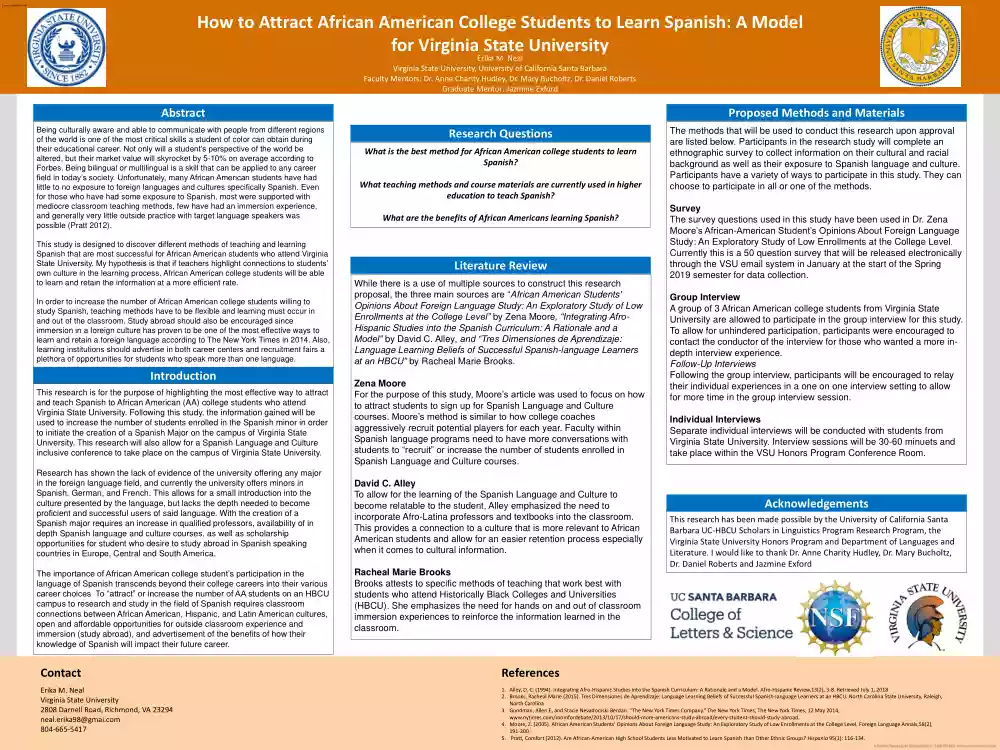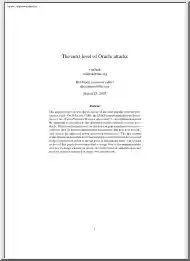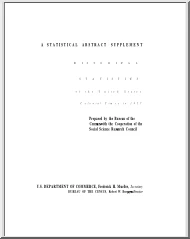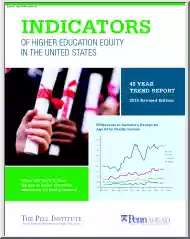Please log in to read this in our online viewer!

Please log in to read this in our online viewer!
No comments yet. You can be the first!
What did others read after this?
Content extract
How to Attract African American College Students to Learn Spanish: A Model for Virginia State University Erika M. Neal Virginia State University, University of California Santa Barbara Faculty Mentors: Dr. Anne Charity Hudley, Dr Mary Bucholtz, Dr Daniel Roberts Graduate Mentor: Jazmine Exford Abstract Being culturally aware and able to communicate with people from different regions of the world is one of the most critical skills a student of color can obtain during their educational career. Not only will a student’s perspective of the world be altered, but their market value will skyrocket by 5-10% on average according to Forbes. Being bilingual or multilingual is a skill that can be applied to any career field in today’s society. Unfortunately, many African American students have had little to no exposure to foreign languages and cultures specifically Spanish. Even for those who have had some exposure to Spanish, most were supported with mediocre classroom teaching methods, few
have had an immersion experience, and generally very little outside practice with target language speakers was possible (Pratt 2012). This study is designed to discover different methods of teaching and learning Spanish that are most successful for African American students who attend Virginia State University. My hypothesis is that if teachers highlight connections to students’ own culture in the learning process, African American college students will be able to learn and retain the information at a more efficient rate. In order to increase the number of African American college students willing to study Spanish, teaching methods have to be flexible and learning must occur in and out of the classroom. Study abroad should also be encouraged since immersion in a foreign culture has proven to be one of the most effective ways to learn and retain a foreign language according to The New York Times in 2014. Also, learning institutions should advertise in both career centers and
recruitment fairs a plethora of opportunities for students who speak more than one language. Introduction Proposed Methods and Materials Research Questions What is the best method for African American college students to learn Spanish? What teaching methods and course materials are currently used in higher education to teach Spanish? What are the benefits of African Americans learning Spanish? Literature Review While there is a use of multiple sources to construct this research proposal, the three main sources are “African American Students' Opinions About Foreign Language Study: An Exploratory Study of Low Enrollments at the College Level” by Zena Moore, “Integrating AfroHispanic Studies into the Spanish Curriculum: A Rationale and a Model” by David C. Alley, and “Tres Dimensiones de Aprendizaje: Language Learning Beliefs of Successful Spanish-language Learners at an HBCU” by Racheal Marie Brooks. This research is for the purpose of highlighting the most effective
way to attract and teach Spanish to African American (AA) college students who attend Virginia State University. Following this study, the information gained will be used to increase the number of students enrolled in the Spanish minor in order to initiate the creation of a Spanish Major on the campus of Virginia State University. This research will also allow for a Spanish Language and Culture inclusive conference to take place on the campus of Virginia State University. Zena Moore For the purpose of this study, Moore’s article was used to focus on how to attract students to sign up for Spanish Language and Culture courses. Moore’s method is similar to how college coaches aggressively recruit potential players for each year. Faculty within Spanish language programs need to have more conversations with students to “recruit” or increase the number of students enrolled in Spanish Language and Culture courses. Research has shown the lack of evidence of the university offering
any major in the foreign language field, and currently the university offers minors in Spanish, German, and French. This allows for a small introduction into the culture presented by the language, but lacks the depth needed to become proficient and successful users of said language. With the creation of a Spanish major requires an increase in qualified professors, availability of in depth Spanish language and culture courses, as well as scholarship opportunities for student who desire to study abroad in Spanish speaking countries in Europe, Central and South America. David C. Alley To allow for the learning of the Spanish Language and Culture to become relatable to the student, Alley emphasized the need to incorporate Afro-Latina professors and textbooks into the classroom. This provides a connection to a culture that is more relevant to African American students and allow for an easier retention process especially when it comes to cultural information. The importance of African
American college student’s participation in the language of Spanish transcends beyond their college careers into their various career choices. To “attract” or increase the number of AA students on an HBCU campus to research and study in the field of Spanish requires classroom connections between African American, Hispanic, and Latin American cultures, open and affordable opportunities for outside classroom experience and immersion (study abroad), and advertisement of the benefits of how their knowledge of Spanish will impact their future career. Racheal Marie Brooks Brooks attests to specific methods of teaching that work best with students who attend Historically Black Colleges and Universities (HBCU). She emphasizes the need for hands on and out of classroom immersion experiences to reinforce the information learned in the classroom. The methods that will be used to conduct this research upon approval are listed below. Participants in the research study will complete an
ethnographic survey to collect information on their cultural and racial background as well as their exposure to Spanish language and culture. Participants have a variety of ways to participate in this study. They can choose to participate in all or one of the methods. Survey The survey questions used in this study have been used in Dr. Zena Moore’s African-American Student’s Opinions About Foreign Language Study: An Exploratory Study of Low Enrollments at the College Level. Currently this is a 50 question survey that will be released electronically through the VSU email system in January at the start of the Spring 2019 semester for data collection. Group Interview A group of 3 African American college students from Virginia State University are allowed to participate in the group interview for this study. To allow for unhindered participation, participants were encouraged to contact the conductor of the interview for those who wanted a more indepth interview experience. Follow-Up
Interviews Following the group interview, participants will be encouraged to relay their individual experiences in a one on one interview setting to allow for more time in the group interview session. Individual Interviews Separate individual interviews will be conducted with students from Virginia State University. Interview sessions will be 30-60 minuets and take place within the VSU Honors Program Conference Room. Acknowledgements This research has been made possible by the University of California Santa Barbara UC-HBCU Scholars in Linguistics Program Research Program, the Virginia State University Honors Program and Department of Languages and Literature. I would like to thank Dr Anne Charity Hudley, Dr Mary Bucholtz, Dr. Daniel Roberts and Jazmine Exford Contact References Erika M. Neal Virginia State University 2808 Darnell Road, Richmond, VA 23294 neal.erika98@gmaicom 804-665-5417 1. Alley, D C (1994) Integrating Afro-Hispanic Studies into the Spanish Curriculum: A
Rationale and a Model Afro-Hispanic Review,13(2), 3-8 Retrieved July 1, 2018 2. Brooks, Racheal Marie (2015) Tres Dimensiones de Aprendizaje: Language Learning Beliefs of Successful Spanish-language Learners at an HBCU North Carolina State University, Raleigh, North Carolina 3. Goodman, Allen E, and Stacie Nevadomski Berdan “The New York Times Company” The New York Times, The New York Times, 12 May 2014, www.nytimescom/roomfordebate/2013/10/17/should-more-americans-study-abroad/every-student-should-study-abroad 4. Moore, Z (2005) African American Students' Opinions About Foreign Language Study: An Exploratory Study of Low Enrollments at the College Level Foreign Language Annals,58(2), 191-200. 5. Pratt, Comfort (2012) Are African-American High School Students Less Motivated to Learn Spanish than Other Ethnic Groups? Hispania 95(1): 116-134
have had an immersion experience, and generally very little outside practice with target language speakers was possible (Pratt 2012). This study is designed to discover different methods of teaching and learning Spanish that are most successful for African American students who attend Virginia State University. My hypothesis is that if teachers highlight connections to students’ own culture in the learning process, African American college students will be able to learn and retain the information at a more efficient rate. In order to increase the number of African American college students willing to study Spanish, teaching methods have to be flexible and learning must occur in and out of the classroom. Study abroad should also be encouraged since immersion in a foreign culture has proven to be one of the most effective ways to learn and retain a foreign language according to The New York Times in 2014. Also, learning institutions should advertise in both career centers and
recruitment fairs a plethora of opportunities for students who speak more than one language. Introduction Proposed Methods and Materials Research Questions What is the best method for African American college students to learn Spanish? What teaching methods and course materials are currently used in higher education to teach Spanish? What are the benefits of African Americans learning Spanish? Literature Review While there is a use of multiple sources to construct this research proposal, the three main sources are “African American Students' Opinions About Foreign Language Study: An Exploratory Study of Low Enrollments at the College Level” by Zena Moore, “Integrating AfroHispanic Studies into the Spanish Curriculum: A Rationale and a Model” by David C. Alley, and “Tres Dimensiones de Aprendizaje: Language Learning Beliefs of Successful Spanish-language Learners at an HBCU” by Racheal Marie Brooks. This research is for the purpose of highlighting the most effective
way to attract and teach Spanish to African American (AA) college students who attend Virginia State University. Following this study, the information gained will be used to increase the number of students enrolled in the Spanish minor in order to initiate the creation of a Spanish Major on the campus of Virginia State University. This research will also allow for a Spanish Language and Culture inclusive conference to take place on the campus of Virginia State University. Zena Moore For the purpose of this study, Moore’s article was used to focus on how to attract students to sign up for Spanish Language and Culture courses. Moore’s method is similar to how college coaches aggressively recruit potential players for each year. Faculty within Spanish language programs need to have more conversations with students to “recruit” or increase the number of students enrolled in Spanish Language and Culture courses. Research has shown the lack of evidence of the university offering
any major in the foreign language field, and currently the university offers minors in Spanish, German, and French. This allows for a small introduction into the culture presented by the language, but lacks the depth needed to become proficient and successful users of said language. With the creation of a Spanish major requires an increase in qualified professors, availability of in depth Spanish language and culture courses, as well as scholarship opportunities for student who desire to study abroad in Spanish speaking countries in Europe, Central and South America. David C. Alley To allow for the learning of the Spanish Language and Culture to become relatable to the student, Alley emphasized the need to incorporate Afro-Latina professors and textbooks into the classroom. This provides a connection to a culture that is more relevant to African American students and allow for an easier retention process especially when it comes to cultural information. The importance of African
American college student’s participation in the language of Spanish transcends beyond their college careers into their various career choices. To “attract” or increase the number of AA students on an HBCU campus to research and study in the field of Spanish requires classroom connections between African American, Hispanic, and Latin American cultures, open and affordable opportunities for outside classroom experience and immersion (study abroad), and advertisement of the benefits of how their knowledge of Spanish will impact their future career. Racheal Marie Brooks Brooks attests to specific methods of teaching that work best with students who attend Historically Black Colleges and Universities (HBCU). She emphasizes the need for hands on and out of classroom immersion experiences to reinforce the information learned in the classroom. The methods that will be used to conduct this research upon approval are listed below. Participants in the research study will complete an
ethnographic survey to collect information on their cultural and racial background as well as their exposure to Spanish language and culture. Participants have a variety of ways to participate in this study. They can choose to participate in all or one of the methods. Survey The survey questions used in this study have been used in Dr. Zena Moore’s African-American Student’s Opinions About Foreign Language Study: An Exploratory Study of Low Enrollments at the College Level. Currently this is a 50 question survey that will be released electronically through the VSU email system in January at the start of the Spring 2019 semester for data collection. Group Interview A group of 3 African American college students from Virginia State University are allowed to participate in the group interview for this study. To allow for unhindered participation, participants were encouraged to contact the conductor of the interview for those who wanted a more indepth interview experience. Follow-Up
Interviews Following the group interview, participants will be encouraged to relay their individual experiences in a one on one interview setting to allow for more time in the group interview session. Individual Interviews Separate individual interviews will be conducted with students from Virginia State University. Interview sessions will be 30-60 minuets and take place within the VSU Honors Program Conference Room. Acknowledgements This research has been made possible by the University of California Santa Barbara UC-HBCU Scholars in Linguistics Program Research Program, the Virginia State University Honors Program and Department of Languages and Literature. I would like to thank Dr Anne Charity Hudley, Dr Mary Bucholtz, Dr. Daniel Roberts and Jazmine Exford Contact References Erika M. Neal Virginia State University 2808 Darnell Road, Richmond, VA 23294 neal.erika98@gmaicom 804-665-5417 1. Alley, D C (1994) Integrating Afro-Hispanic Studies into the Spanish Curriculum: A
Rationale and a Model Afro-Hispanic Review,13(2), 3-8 Retrieved July 1, 2018 2. Brooks, Racheal Marie (2015) Tres Dimensiones de Aprendizaje: Language Learning Beliefs of Successful Spanish-language Learners at an HBCU North Carolina State University, Raleigh, North Carolina 3. Goodman, Allen E, and Stacie Nevadomski Berdan “The New York Times Company” The New York Times, The New York Times, 12 May 2014, www.nytimescom/roomfordebate/2013/10/17/should-more-americans-study-abroad/every-student-should-study-abroad 4. Moore, Z (2005) African American Students' Opinions About Foreign Language Study: An Exploratory Study of Low Enrollments at the College Level Foreign Language Annals,58(2), 191-200. 5. Pratt, Comfort (2012) Are African-American High School Students Less Motivated to Learn Spanish than Other Ethnic Groups? Hispania 95(1): 116-134




